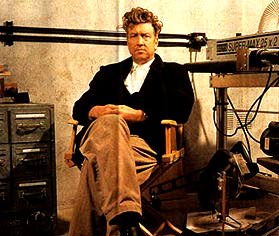 David Lynch
David Lynch From the early 1940's until her death in 1961, Maya Deren both evoked and exemplified the American
avant-garde movement...Meshes of the Afternoon set the tone for the decade and linked the movement to the older
European avant-garde films of Cocteau and Bunuel." - The New York Times
"Intensely personal, symbolic and surreal films that reveal her deepest, darkest fantasies with constantly inventive and
mysterious cinematic techniques. She's Fellini and Bergman wrapped in one gloriously possessed body. Watching these
films can change forever your concept of what cinema can be." - L. A. Weekly
Maya Deren was born Eleanora Derenkowsky in 1917 in Kiev during the Russian Revolution. Her father took the family to the United States to escape the anti-Jewish pogroms in the Ukraine. She became interested in film while a student at Syracuse University, and later took a B.A. from New York University and
an M.A. from Smith College.
Maya had already established a reputation as an
aesthetic theorist, photographer and maker of "personal"
experimental movies - what she called "chamber films."
These were high concept, low budget, technically
innovative, artistically uncompromising, doggedly
noncommercial and psychologically challenging when
not outright disturbing.
Maya received a Guggenheim grant to film Haitian dance for a photo-montage project. It was both
the first awarded for creative filmmaking and the first awarded to a
woman. She made her first trip to Haiti in the spring of
1947.
Return to Dharma Bums Maya Deren
Maya Deren
"Maya Deren began her creative life as a poet, and then turned her verbal images into visual ones as a filmmaker, and with the book Divine Horsemen broke through everyday life into the world of symbolism and myth. She died young, at age 44,
but left an impressive body of work. She is celebrated for her pioneering work in Haitian studies - she filmed over nine
hours of footage and recorded 48 hours of sound. Her film Divine Horsemen was completed posthumously by Teiji and
Cherel Ito and her audio recordings are in distribution. She is best known today as the 'mother of American avant-garde
film'."
Return to 'the Activists'
Return to Dharma Bums